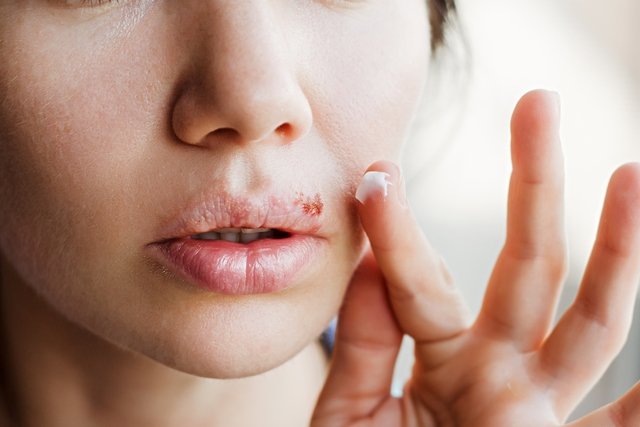Cold sores is an infection caused by the virus herpes simplex which causes blisters or sores in the mouth, usually in the lip region, lasting around 10 days and can cause tingling, pain and/or itching in the region where they appear.
Cold sores are highly contagious as they are caught through direct contact, as can happen during a kiss, or through the use of shared objects such as glasses, cutlery or towels, for example.
Read too: Herpes: what it is, symptoms, types, transmission and treatment
Most of the time, the immune system itself eliminates the herpes virus, curing the infection, but there are some antiviral medications that can be applied to the area to help you recover faster.

Symptoms of cold sores
The main symptoms of cold sores are:
- Small wound on the lip;
- Sensitive blisters;
- Pain when moving the mouth;
- Itching and redness in a small area of the lip.
It is often possible to recognize, up to 48 hours before the appearance of blisters on the lip, that you are going to have an episode of herpes, as there are symptoms that precede the rash, such as tingling, itching, redness and discomfort on the lips.
Don’t ignore the signs your body is giving you!
What causes cold sores
Herpes is a type of virus that, once acquired, normally stays in the body for several years, remaining “dormant” most of the time. However, there are some factors that can lead to the virus causing the appearance of symptoms and, normally, they are related to the weakening of the immune system.
Factors that appear to lead to the development of cold sores are:
- Minor infections, such as the flu or cold;
- Periods of intense stress;
- Presence of immune system diseases, such as HIV or lupus;
- Antibiotic treatment;
- Excessive exposure to the sun.
Furthermore, there are people who can come into contact with the virus, become infected and never show symptoms.
How the treatment is carried out
No type of treatment is necessary for cold sores, as the immune system can fight the virus and resolve symptoms in around 10 days. However, there are some antiviral medications, such as Acyclovir or Valacyclovir, which can be purchased in the form of an ointment and applied to the affected region, helping to alleviate symptoms and helping to combat the virus.
In more serious cases, where herpes spreads to other parts of the body or when it takes a long time to disappear, the doctor may recommend the use of oral antivirals, which are taken in pill form to help the immune system fight the virus. . These cases are more frequent in people who have a weakened immune system, such as people undergoing cancer treatment or with autoimmune diseases.
Check out a home treatment for mouth herpes, with teas and ointments that can be prepared at home.
What to do to avoid getting cold sores
To avoid getting herpes in the mouth, it is recommended:
- Avoid kissing strangers or people with mouth wounds;
- Do not share personal objects with other people, especially cutlery, glasses or face towels;
- Avoid using borrowed lipstick;
- Do not eat or taste other people’s food such as popsicles, lollipops or ice cream;
- Avoid using soap in public spaces.
These are just a few rules to follow to avoid getting cold sores, the most important thing being to avoid contact with anything you don’t know who it was used by or that may have been in contact with the mouth or hands of someone infected with herpes.
Bibliography
- VIRTUAL HEALTH LIBRARY. Herpes (herpes simples, herpes labial). Available at: <https://bvsms.saude.gov.br/bvs/dicas/230_herpes.html>. Accessed on Jul 28, 2021
- JOHNS HOPKINS MEDICINE. Oral Herpes. Disponível em: <https://www.hopkinsmedicine.org/health/conditions-and-diseases/herpes-hsv1-and-hsv2/oral-herpes>. Acesso em 28 jul 2021
- NHS. Cold sores. Available at: <https://www.nhs.uk/conditions/cold-sores/>. Accessed on Jul 28, 2021

Sign up for our newsletter and stay up to date with exclusive news
that can transform your routine!
Warning: Undefined array key "title" in /home/storelat/public_html/wp-content/plugins/link-whisper-premium/templates/frontend/related-posts.php on line 12
Warning: Undefined array key "title_tag" in /home/storelat/public_html/wp-content/plugins/link-whisper-premium/templates/frontend/related-posts.php on line 13




